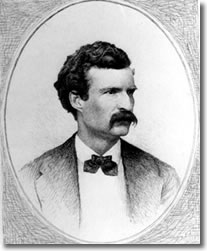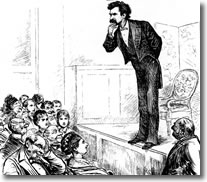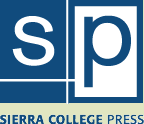"The Trouble Will Begin at Eight" - Mark Twain’s Lectures in Grass Valley and Nevada City
The story of Mark Twain as the world-famous author of Tom Sawyer and Huckleberry Finn are well-known. Almost as familiar is Twain’s more than thirty year career as an amusing lecturer. However, it is little reported that among Twain’s very first appearances as a lecturer were in Grass Valley, Nevada City, and environs in 1866.
In 1866, Samuel Clemens (who had adopted the pen name “Mark Twain” a few years earlier) was a promising but struggling reporter who had yet to publish a major work. He was best known for his articles in the Virginia City Territorial Enterprise and some travel articles for Sacramento and San Francisco newspapers. In 1866, however, he had traveled to Hawaii, then called the Sandwich Islands, and had provided correspondence of his adventures to California newspapers. Twain’s writings sparked public interest, and, upon his return to the mainland, Twain was engaged to give a lecture about his experiences on October 2, 1866, in San Francisco. It would be the first of hundreds of public presentations. By Twain’s own account, he was terrified. As Twain wrote about his first lecture in his book Roughing It, “I thought of suicide, pretended illness, flight …. I was very miserable and scared.” However, the lecture was a great success and a multiple-city lecture tour was hastily arranged. The schedule included appearances in Grass Valley on October 20, 1866, and in Nevada City on October 23. Twain would also speak in the nearby communities of Red Dog and You Bet.
"Wonderful Feats"
 From the beginning, Twain’s lectures were always preceded by clever advertising. His appearances in Nevada County were no exception. In the Grass Valley Daily Union ad for his Grass Valley appearance, Twain promised that, after the lecture, he would perform a series of “wonderful feats of SLEIGHT OF HAND, if desired to do so.” His “wonderful feats” involved drinking multiple shots of whiskey, leaving town suddenly without paying his hotel bill, and, as he put it, to “at any hour of the night, after 10, … go through any house in the city, no matter how dark it may be, and take an inventory of its contents, and not miss any of the articles as the owner will in the morning.” Frequently, his advertisements would state “The doors will open at 7 o’clock, and the trouble will begin at 8.”
From the beginning, Twain’s lectures were always preceded by clever advertising. His appearances in Nevada County were no exception. In the Grass Valley Daily Union ad for his Grass Valley appearance, Twain promised that, after the lecture, he would perform a series of “wonderful feats of SLEIGHT OF HAND, if desired to do so.” His “wonderful feats” involved drinking multiple shots of whiskey, leaving town suddenly without paying his hotel bill, and, as he put it, to “at any hour of the night, after 10, … go through any house in the city, no matter how dark it may be, and take an inventory of its contents, and not miss any of the articles as the owner will in the morning.” Frequently, his advertisements would state “The doors will open at 7 o’clock, and the trouble will begin at 8.”
For the Grass Valley lecture, it was briefly proposed to link Twain’s appearance with a tightrope act simultaneously appearing in town. The circus act may have been that of Rosa Celeste, who, a few days earlier in Rough and Ready, had seen an unfortunate and thankfully harmless accident. For her act, Rosa Celeste walked on the rope pushing a wooden wheelbarrow. Briefly losing her balance, it appeared that she was about to fall. A miner in the audience rushed forward to catch her. Rosa Celeste did not fall, but the wheelbarrow did. The wheelbarrow fell on the miner’s head. His head poked through bottom of the wheelbarrow, and he ended up with the bottomless wheelbarrow draping his shoulders. As the 1880 Thompson and West History of Nevada County recounted, “The man suffered no injury but what … a few drinks of whiskey could repair.” Twain wisely declined to be a double bill with a street carnival attraction.
Sandwich Islanders
Each 1866 lecture focused on the Hawaiian Islands. Twain recounted, in comical style, the characteristics, customs, habits, vices and virtues of the Sandwich Islanders. An additional highlight was a serious description of the volcano Kilauea. Upon conclusion, the theaters rang with thunderous applause. At his curtain calls, Twain jokingly apologized to the audience for inflicting his lecture upon them, explaining that he needed the money.
Mark Twain was not a professional entertainer, and his delivery left something to be desired. But, as a critic in the San Francisco Evening Bulletin commented at the time: “He displayed not the polish of the finished lecturer—nor did he need it; the crude, quaint delivery was infinitely preferable.” As another contemporary critic remarked of Twain’s performance, his “method as a lecturer was distinctly unique and novel. His slow, deliberate drawl, the anxious and perturbed expression of his visage, the apparently painful effort with which he framed his sentences, …. All this was original; it was Mark Twain.” Audiences loved his folksy, comical commentary presented with such a serious demeanor.
Celebrated Introductions
 The Grass Valley and Nevada City lectures were widely praised. It was in Grass Valley that Twain experienced one of the first inadvertently funny introductions that Twain would mention in many subsequent lectures. The unprepared introducer said, “Ladies and Gentlemen, this is the celebrated Mark Twain from the celebrated city of San Francisco, with his celebrated lecture about the celebrated Sandwich Islands.” A few days later at Red Dog, a mining community near Dutch Flat, the introduction so tickled Twain that he frequently used it to introduce himself for years to come. The speaker said, “Ladies and Gentlemen, I shall not waste any unnecessary time in the introduction. I don’t know anything about this man; at least I know only two things about him; one is that he has never been in the Penitentiary, and another is that I can’t imagine why not.”
The Grass Valley and Nevada City lectures were widely praised. It was in Grass Valley that Twain experienced one of the first inadvertently funny introductions that Twain would mention in many subsequent lectures. The unprepared introducer said, “Ladies and Gentlemen, this is the celebrated Mark Twain from the celebrated city of San Francisco, with his celebrated lecture about the celebrated Sandwich Islands.” A few days later at Red Dog, a mining community near Dutch Flat, the introduction so tickled Twain that he frequently used it to introduce himself for years to come. The speaker said, “Ladies and Gentlemen, I shall not waste any unnecessary time in the introduction. I don’t know anything about this man; at least I know only two things about him; one is that he has never been in the Penitentiary, and another is that I can’t imagine why not.”
Twain realized a profit of about $1200 from this 1866 series of fifteen or sixteen lectures that consumed about ten weeks of his time. This was a not inconsiderable sum for the time. It provided Twain with the promise of a brighter future. As historian Fred Lorch stated, this first lecture tour “not only catapulted him suddenly from poverty to comparative affluence, [it also] … opened for him a new vista of activity and destroyed his fears about how he might earn a living.” And Nevada County gave him an early boost.
Fame Followed
Soon after this lecture tour, Twain published The Innocents Abroad, an account of his travels in Europe, and his writing career and fame became established.
Twain continued to lecture and in April 1868, he returned to Nevada County. At Nevada City on April 20th, he characteristically advertised that “the doors will be surrounded at 7 o’clock and the insurrection will begin at 8.”
